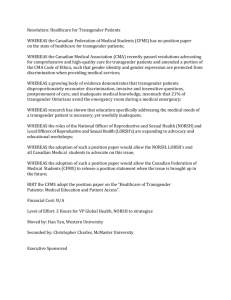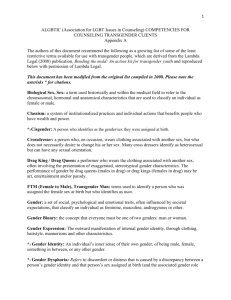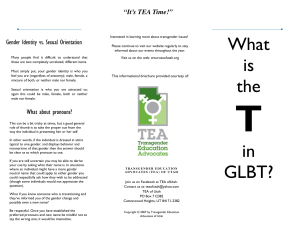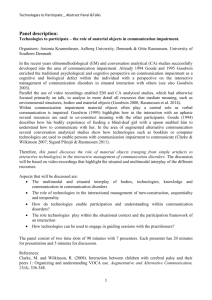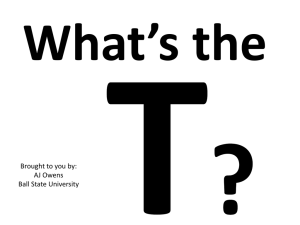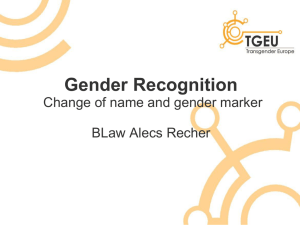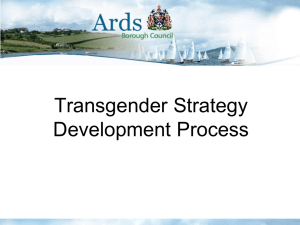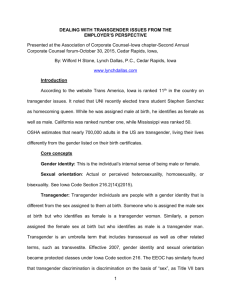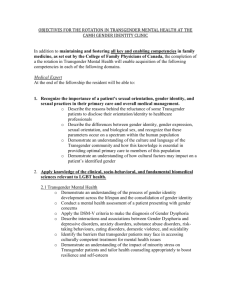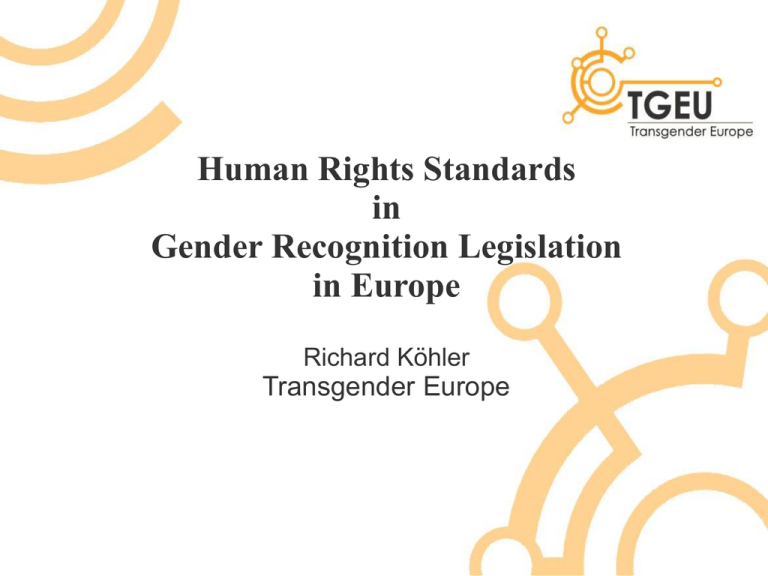
Human Rights Standards
in
Gender Recognition Legislation
in Europe
Richard Köhler
Transgender Europe
Introduction
Procedure
Requirements
Effects
Transgender Europe
Not-for-Profit European umbrella organisation (founded 2005,
registered under German law)
75 member organisations in 35 European countries
Working for trans* equality in Europe
Advocacy and capacity building
Global research project Transrespect versus Transphobia
Worldwide www.transrespect-transphobia.org
Participative status at the CoE since 2013
Terminology
Gender identity is understood to refer to each
person’s deeply felt internal and individual experience
of gender, which may or may not correspond with the
sex assigned at birth, including the personal sense of
the body (which may involve, if freely chosen,
modification of bodily appearance or function by
medical, surgical or other means) and other
expressions of gender, including dress, speech and
mannerisms.
Yogyakarta Principles, Principles on the application of international human rights law in
relation to sexual orientation and gender identity http://www.yogyakartaprinciples.org
Requirements
EU Fundamental Rights Agency: 73% of trans respondents
did not identify within the gender binary
Introduction
Recognition of Name & Gender = Affirmation of Citizenship
Legally speaking:
Legal Gender Recognition (LGR) = Protection of the
individuals right to private live (art. 8 ECHR)
Positive obligation:
CoE Member States must allow legal gender recognition
(Goodwin & I. v. UK, 28957/95 & 25680/94, 2002)
Procedure
Procedure
CM/Recommendation 2010(05), Para 21
Procedures must be quick, transparent, accessible.
• Quick: Portuguese law 8 days
• Transparent: clear procedure in a law, including
implementation and responsible bodies
• Accessible: practical aspects, e.g. change of name in
UK from 5-10 £ and in Argentina for free, no degrading
procedure, accessible language, etc.
Requirements
Requirements
States margin of appreciation, but:
• “having regard to scientific and societal
developments” Goodwin > Standards of Care 7
• Fulfilling requirements set by the state must be
possible within the respective state. L v Lithuania,
27527/03, 2007
• “(…) should be regularly reviewed in order to remove
abusive requirements.” CM/Rec(2010)05
• “(…) for changing identity to be simplified (…)” EU Parl.
Resolution, 28.9.2011
Requirements
No creation of dilemma between the individuals right
to LGR (protection of private life) and other
fundamental rights (e.g. human dignity, physical
integrity, free from torture, fair trial etc.)
Requirements
Compulsory medical intervention
i.e. hormons, surgery, sterilization
violation of several human rights: physical integrity,
degrading treatment / torture, procreation, human dignity
Commissioner for Human Rights, Issue Paper 2009:
«Abolish sterilisation and other compulsary medical
treatment as a necessary legal requirement to
recognise a person’s gender identity in laws»
Requirements
Putting an end to coerced sterilisations and castrations:
Report to the PACE 2013, Liliane Maury Pasquier
“(…) even where consent is ostensibly given – also in
written form – , it can be invalid if the victim has been
misinformed, intimidated, or manipulated with financial
or other incentives (…). various definitions of “coerced”.
These are mainly directed against transgender persons
(…). Neither forced nor coerced sterilisations or
castrations can be legitimated in any way in the 21st
century – they must stop.”
Requirements
UN Special Rapporteur on torture and other cruel,
inhuman or degrading treatment or punishment, on
lesbian, gay, bisexual, transgender and intersex persons
(2013):
«The Special Rapporteur calls upon [all states] to
outlaw forced or coerced sterilization in all
circumstances and provide special protection to
individuals belonging to marginalized groups.”
Requirements
No forced sterilization in Europe:
Portugal, Spain, Hungary, Sweden, UK, Iceland,
Germany, Austria, Belarus, Estonia
Cases: Switzerland, Italy, France
No medical interventions in Europe:
5 countries: Austria, Germany, Hungary, Portugal, UK
Requirements
Diagnosis or medical opinion
• conflict with human dignity to label a healthy person as
mentally ill
Real live experience and physical examinations
• Not state of the medical art according to WPATH,
Standards of Care Version 7
Requirements
Forced divorce
• protection of existing marital unions
• is there an equivalent to marriage?
• no restriction of childrens’ and partners’ own rights
Commissioner for Human Rights, Issue Paper 2009:
«Remove any restriction on the right of transgender
persons to remain in an existing marriage following a
recognised change of gender»
Hämäläinen v Finland: pending at ECtHR Grand
Chamber
Requirements
No forced divorce in Europe:
Austria, Belgium, Denmark, Estonia, Finland, Georgia,
Germany, Iceland, Luxembourg, Netherlands, Norway,
Portugal, Romania, Spain, Sweden, Switzerland
Court Decisions Germany (2008):
●
●
Marriage is protected in the constitution and cannot be
disolved by the state
Does not result in opening of marriage for same-sex
couples
Effects
Effects
«(…) renders its rights practical and effective, not
theoretical and illusory» Goodwin & I.
«(…) guarantee to full legal recognition of a person’s
gender reassignment in all areas of life, in particular
by making possible the change of name and gender in
official documents in a quick, transparent and
accessible way (…) corresponding recognition and
changes by non-state actors with respect to key
documents» CM/Rec(2010)05
> Obligation not limited to state actors
Effects
Disclosure ban: key!
All registries and documents to be changed without any
trace. Birth certificate: obligation since Goodwin & I
Automatic and full protection against disclosure in
the law: no third party can find out that a LGR
happend (decision, registries, documents, etc.)
State and non-state actors: including documents issued
earlier
Effects
Full legal capacity: access all rights associated with the
confirmed gender?
Right to marry according to the legal gender: Goodwin &
I.; CM/Rec(2010)05
Pension, work place and similar rights: non-equal
treatment with the confirmed gender is discrimination
according to ECJ (European Union)
Effects
Parent-Child Relation
Barring a (legal) relationship or guardian / visiting rights
only because of a parents gender identity is a
discrimination (P v. Spain, 35159/09, 2010)
Right of the Child to be cared for by his or her parents
(art. 7 (1) UN CRC), not be separated from them
against their will (art. 9 UN CRC), common
responsibilities of both parents for the upbringing and
development of the child (art. 18 UN CRC), right to
non-discrimination
Conclusions
Guiding Principles Gender Recognition Legislation
Protection of Private Life
Procedure:
Quick, Accessible and Transparent
Requirements: No Dilemma
Effects:
Full Legal Capacity
Questions?
Richard Köhler
Richard@tgeu.org


